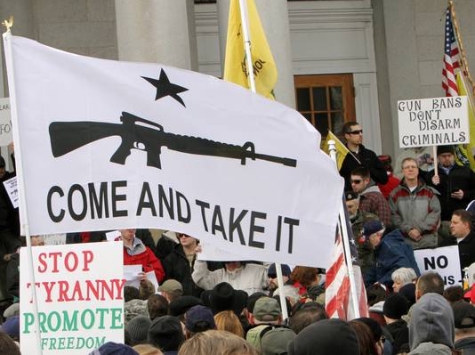(AP) Senate panel approves assault weapons ban
By ALAN FRAM
Associated Press
WASHINGTON
The Senate Judiciary Committee has approved an assault weapons ban in a party -line vote that underscores how hard it will be for the measure to survive in the full Senate.
The proposal by California Democratic Sen. Dianne Feinstein was approved on a 10-8 vote Thursday by the Democratic-controlled committee.
An assault rifle was used by the man who killed 26 elementary school students and staff in Newtown, Conn., in December. Banning the weapons is key to President Barack Obama’s plan to curb gun violence.
The measure is not expected to survive in the Senate. Feinstein faces overwhelming GOP opposition and likely defections by up to six moderate Democrats facing re-election next year in Republican-leaning states in the South and West.
THIS IS A BREAKING NEWS UPDATE. Check back soon for further information. AP’s earlier story is below.
The Senate Judiciary Committee has rejected a Republican effort to exempt victims of sexual assault from a proposed assault weapons ban.
The Democratic-controlled panel rejected the amendment by a party-line, 10-8 vote as it debates a bill prohibiting assault weapons.
The amendment’s sponsor is Texas GOP Sen. John Cornyn. He says letting victims of sexual abuse use weapons would help them protect themselves.
California Democratic Sen. Dianne Feinstein is sponsoring the broader bill to ban assault weapons. She says people can defend themselves just as well with handguns.
THIS IS A BREAKING NEWS UPDATE. Check back soon for further information. AP’s earlier story is below.
The sponsor of an assault weapons ban is conceding that she’ll need lots of help from President Barack Obama and others for the proposal to have a chance of surviving in the Senate.
The Democratic-led Senate Judiciary Committee seemed certain to approve the measure Thursday, probably on a party-line vote. But once it reaches the full Senate _ probably in April _ the measure appears destined for defeat, thanks to opposition by Republicans and some moderate Democrats, as well.
Obama made an assault weapons ban part of the gun curbs he proposed in January, a month after a shooter with an assault rifle killed 20 first-graders and six educators at a school in Newtown, Conn. Feinstein and others have argued that such firearms are used in a disproportionate number of mass shootings and shouldn’t be available to civilians.
The prohibition has emerged as one of the most controversial of the gun restrictions being considered in Congress. Foes of barring the weapons say law-abiding citizens should not lose their Second Amendment right to own the weapons, which they say are popular for self-defense, hunting and collecting.
Feinstein’s bill would also ban large-capacity ammunition magazines carrying more than 10 rounds, which she and her allies say allow shooters to inflict more casualties before pausing to reload, which is when they might be stopped. Adam Lanza, the Newtown gunman, was said to have had 30-round magazines.
The measure’s passage by the Judiciary panel has been a foregone conclusion for some time. It will be far more vulnerable in the full Senate, where Democrats are expected to need 60 votes for passage through the 100-member chamber. That is where the NRA and other pro-gun groups are working hard for the ban’s defeat.
There are 53 Democrats plus two independents who generally side with them. Republicans seem ready to oppose the ban overwhelmingly, and Feinstein can’t count on a half-dozen Democrats from Republican-leaning states who face re-election next year.
The ban also stands little chance of approval in the GOP-controlled House.
Feinstein’s bill would ban semi-automatic weapons _ guns that fire one round and automatically reload _ that can take a detachable magazine and have at least one military feature like a pistol grip.
It specifically bans 157 named weapons. But in an effort to avoid antagonizing those who use them for sports, the measure allows 2,258 rifles and shotguns that are frequently used by hunters.
It also exempts any weapons that are lawfully owned whenever the bill is enacted.
Feinstein was a leader in passage of a 1994 ban on assault weapons and high-capacity magazines. Congress failed to renew it when it expired in 2004.
There are no definitive figures on assault weapons or high-capacity ammunition magazines in the U.S., since there are no government registries of firearms and Congress has curbed federal research on guns since the late 1990s.
When the previous assault weapons ban took effect in 1994, there were an estimated 1.5 million assault weapons and at least 25 million large-capacity magazines that were privately owned in the U.S.
Proponents of banning the weapons cite studies showing that once the assault weapons ban took hold, the portion of gun crimes using those firearms dropped by up to 72 percent in six cities surveyed. They also argue that each assault weapon taken off the streets reduces the potential for mass shootings.
Opponents cite studies showing that assault weapons have been used in fewer than 1 in 10 crimes involving firearms and argue that eliminating those weapons would put only a minor dent in gun violence. High-capacity magazines are involved in up to a quarter of gun crimes.
The Judiciary Committee has already approved three other measures expanding the requirement for background checks for gun buyers; toughening federal laws against illegal gun traffickers and those who purchase weapons for people barred from owning them; and increasing aid for school safety.

COMMENTS
Please let us know if you're having issues with commenting.